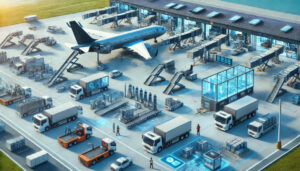The Aircraft Ground Handling System Market plays a critical role in ensuring the smooth operations of airlines, airports, and ground service providers. As air travel demand increases, ground handling systems are evolving with advanced automation, sustainability initiatives, and technological innovations. The market is expected to witness significant growth, driven by rising air passenger traffic, increasing aircraft fleet sizes, and the need for efficient turnaround times at airports.
Market Overview and Growth Prospects
The Aircraft Ground Handling System Market is expanding rapidly due to increasing global air travel and the modernization of airport infrastructure. Efficient ground handling services are essential for minimizing flight delays, reducing operational costs, and improving passenger experience. The growing adoption of electric and autonomous ground support equipment is also transforming the industry, reducing carbon emissions and improving efficiency.
Technological advancements in automated baggage handling, aircraft towing, refueling systems, and cargo handling are further accelerating market growth. Additionally, the increasing demand for low-cost carriers (LCCs) and expansion of airport infrastructure in emerging economies are key drivers propelling the market forward.
Download Pdf Brochure: https://www.marketsandmarkets.com/pdfdownloadNew.asp?id=264041553
Key Market Drivers
One of the primary factors fueling growth in the Aircraft Ground Handling System Market is the rising global air passenger traffic. With airlines adding more aircraft to their fleets, the demand for efficient ground handling solutions has surged. Airports are investing in smart ground handling systems that incorporate IoT, AI, and machine learning for real-time monitoring and automation.
The shift toward sustainable aviation is another significant driver. Airports and airlines are increasingly adopting electric ground support equipment (e-GSE) to reduce fuel consumption and emissions. Moreover, advancements in autonomous vehicles and robotic baggage handling systems are improving operational efficiency.
Market Challenges
Despite strong growth potential, the Aircraft Ground Handling System Market faces several challenges. High capital investment in advanced ground handling equipment can be a barrier, especially for small and mid-sized airports. The integration of automation and digital systems requires substantial investment and regulatory approvals.
Another challenge is the shortage of skilled labor in the ground handling sector. The industry relies heavily on trained personnel for aircraft marshaling, baggage handling, and aircraft refueling. The shift toward automation helps mitigate this issue, but it requires training and adaptation.
Opportunities in the Market
The increasing focus on digital transformation presents new opportunities in the Aircraft Ground Handling System Market. The adoption of real-time data analytics, AI-driven monitoring systems, and IoT-based asset tracking is improving efficiency and reducing turnaround times at airports.
The demand for advanced cargo handling solutions is also rising with the growth of e-commerce and air freight. Ground handling companies are investing in automated cargo loaders, smart warehousing systems, and predictive maintenance solutions to streamline operations.
Regional Insights
North America holds a significant share in the Aircraft Ground Handling System Market due to the presence of major airports and established airline networks. The region is witnessing increased investment in next-generation ground support equipment and eco-friendly solutions to meet stringent emission regulations.
Europe is also a key player, with major airports focusing on electric ground handling systems and sustainable aviation practices. The European Union’s commitment to green airport initiatives is driving the adoption of alternative fuel-powered ground handling equipment.
Asia-Pacific is expected to witness the highest growth due to rapid airport expansion and increasing air passenger traffic. Countries like China, India, and Southeast Asian nations are investing heavily in airport infrastructure and modernizing ground handling fleets.
Technological Innovations in Ground Handling Systems
Technology is revolutionizing the Aircraft Ground Handling System Market with advancements in AI-driven baggage tracking, automated aircraft towing, and smart apron management systems. AI-powered solutions are reducing human errors and improving efficiency in aircraft servicing.
The use of robotic baggage handling systems is gaining traction, ensuring faster baggage sorting and loading. Similarly, autonomous aircraft tugs are being tested to improve aircraft taxiing operations without fuel consumption.
Sustainability Trends in Ground Handling
Sustainability is a major focus in the market, with airports transitioning to electric and hybrid ground handling equipment. The push toward zero-emission airports is driving investments in electric baggage tractors, hydrogen-powered ground support vehicles, and biofuel-powered aircraft towing systems.
Several leading players are collaborating with governments and environmental organizations to promote sustainable aviation ground operations. The development of solar-powered charging stations for electric ground handling vehicles is another step toward reducing the industry’s carbon footprint.
Competitive Landscape and Key Players
The Aircraft Ground Handling System Market is highly competitive, with leading players focusing on innovation and strategic partnerships. Some of the key companies in the market include:
- Swissport International Ltd. – A global leader in airport ground services, offering passenger and baggage handling, aircraft servicing, and cargo solutions.
- Menzies Aviation – A major player providing ground handling, fueling, and cargo services at numerous airports worldwide.
- Dnata – A leading provider of ground handling, cargo, and travel services, operating across multiple international airports.
- AeroGround Flughafen München GmbH – Specializes in ground handling services at Munich Airport, focusing on automation and sustainable solutions.
- TLD Group – A manufacturer of ground support equipment, offering electric-powered baggage tractors, aircraft tugs, and other solutions.
- JBT Corporation – Provides advanced airport ground support equipment, including automated aircraft docking systems and cargo loaders.
These companies are actively investing in technology-driven solutions and green ground handling systems to improve efficiency and sustainability.
Ask For Sample Report: https://www.marketsandmarkets.com/requestsampleNew.asp?id=264041553
Future Outlook of the Aircraft Ground Handling System Market
The future of the Aircraft Ground Handling System Market looks promising, with rapid advancements in automation, AI, and sustainable solutions. The increasing adoption of autonomous ground handling vehicles and smart airport technologies will reshape the industry.
With governments and aviation authorities pushing for carbon-neutral airport operations, the market is expected to witness a surge in electric ground support equipment (e-GSE) adoption. Airlines and airport operators are also focusing on predictive maintenance technologies to improve asset longevity and reduce downtime.
In the long run, AI-driven decision-making, real-time tracking, and smart logistics management will drive efficiency in ground handling operations. 5G connectivity is also set to enhance communication between ground support teams, improving response times and operational coordination.
The Aircraft Ground Handling System Market is evolving rapidly with technological advancements, sustainability initiatives, and increased demand for efficient airport operations. As air passenger traffic and cargo volumes grow, the need for automated, AI-powered, and eco-friendly ground handling solutions will continue to rise.
With major industry players investing in smart ground handling technologies, electric vehicles, and autonomous systems, the market is set to witness significant transformation in the coming years. Airports and airlines that adopt innovative, sustainable, and cost-effective ground handling solutions will gain a competitive edge in this dynamic market.



